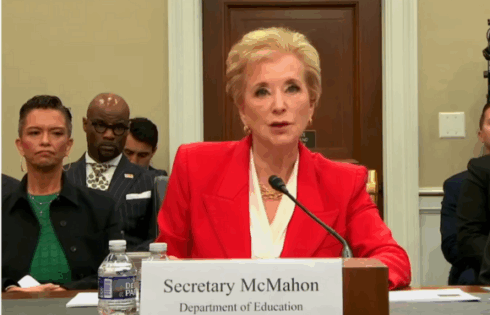
Experts point to cost of college, female-oriented grading practices as reasons for enrollment drop
The University of Michigan has seen a significant drop in male attendance, according to research by Mark Perry, an economics professor and civil rights advocate.
Perry, a professor emeritus at the public university, shared the research recently on X, showing that out of the 21 colleges within the University of Michigan, 19 are now female-dominated.
Even traditionally male-dominated education tracts such as architecture and public policy exhibit over 60 percent female enrollment as of this year. In art, design, music, theater and dance, enrollment is 94 percent female, and nursing is 86 percent, according to the research.
Perry told The College Fix this trend is attributable to several factors at the University of Michigan, chief among them being that young men often no longer find college an economically worthwhile pursuit, and those who do typically face discrimination from their peers.
“When deciding on whether to go to college in the first place, men often have greater high-paying options than women without a college degree in blue-collar occupations …” he said.
Young men are also disincentivized because of the amount of student loan debt incurred with higher learning, Perry said.
The feminization of @UMich — Women outnumber men in 19 of 21 schools and colleges. @RegentHubbard @DetNewsOpinion @CollegeFix @kissel_adam @sfmcguire79 @realchrisrufo @CHSommers @kimberkoz pic.twitter.com/fbAaWG9YJo
— Mark J. Perry (@Mark_J_Perry) May 20, 2025
When contacted about the research, the University of Michigan media relations office initially acknowledged The Fix’s request, but did not respond to its questions.
The low male enrollment numbers are not unique to the Michigan institution.
Recent surveys published at the American Institute for Boys and Men show that men electing to forgo a college education account for 71 percent of enrollment decline nationwide. According to the institute, men now earn two of every five college degrees, and are more likely than women to drop out of college.
Perry said a four-year undergraduate education is not always practical. “Pressuring millions of high school students to attend four-year colleges and accumulate large sums of student loan debt to graduate, only to face weak job prospects in fields that don’t pay well, has been a great disservice to America’s young people,” he told The Fix.
He described “the obsession with college” as “misguided and misplaced.” Perry also said young men’s shift away from four-year college is not necessarily all bad.
Due to the financial burden of higher education, Perry said, “Young men may be providing the blueprint for … a more logical and rational approach to education and career planning.”
The logical approach? Perry said attaining a two-year associate’s degree or certification from a trade school at low cost enables young men to enter the workforce shortly after high school and become financially independent quicker.
In recent years, Perry has filed over 841 complaints against the University of Michigan and other higher education institutions alleging discrimination against male students. These include scholarships and programs exclusively for female students.
MORE: Nearly 90 universities have rebranded their DEI offices, survey finds
Another factor that some experts say is contributing to the drop in male enrollment is behavior-based education and grading. This means that students are graded statistically higher when they behave a specific way.
William Draves, president of the Learning Resources Network, or LERN, said in an interview with The College Fix that this grading “is based in large measure on behavior which: 1) has nothing to do with learning and knowledge; and 2) has nothing to do with preparing someone for the workplace.”
Draves is the co-author of the book “Smart Boys, Bad Grades: Gender Equity in Education.” His organization focuses on higher education research, free speech, continuing education and lifelong learning.
He told The Fix that, because it is convenient for educators, teaching and grading have become conducive to female-specific behavior patterns at all levels of the U.S. school system. This has led to the ostracization of male students and an overall neglect of how most men learn best.
Forbes contributor Nick Morrison also wrote about this in a 2022 article, writing that “teachers unconsciously reward behavior seen as ‘typically female,’ such as neatness and sitting quietly, because it makes their job easier.”
In an article for the Heritage Foundation, policy analyst Brenda Hafera wrote that young men are often viewed as “toxic” in higher education for being masculine.
“Millions of boys and men in America are unmoored, if not lost,” Hafera wrote. “In both subtle and not-so-subtle ways, they are told they are unneeded. Boys find themselves in classrooms that seem designed to frustrate them.”
Moreover, Towson University lecturer Andrew Reiner wrote in an article last year at The Hill that “even mothers of boys, pointed to that sweeping, damning and vague label ‘toxic masculinity.’”
Reiner, the author of “Better Boys, Better Men: The New Masculinity That Creates Greater Courage and Emotional Resiliency,” also wrote: “They spoke to girls’ ‘limitless potential’ versus that of boys. Girls move out of the house earlier, achieve greater academic success, are more likely to attend and graduate from college, find jobs more readily than male peers and have higher emotional IQ.”
This lack of direction in many young men, according to Reiner, is due to the discouragement they experience when they are ostracized for being masculine.
MORE: 10 years after racist incident, fraternity remains barred at U. Oklahoma
IMAGE CAPTION AND CREDIT: Male and female students sit in a row; Baranq/Shutterstock
Like The College Fix on Facebook / Follow us on Twitter






Please join the conversation about our stories on Facebook, Twitter, Instagram, Reddit, MeWe, Rumble, Gab, Minds and Gettr.